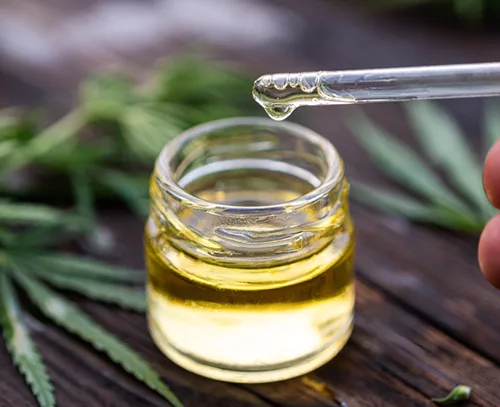CBD for Anxiety: An Update

Steven Hamilton, PhD, MD.
The Permanente Medical Group, Department of Psychiatry, Kaiser Permanente San Francisco Medical Center.
Dr. Hamilton has no financial relationships with companies related to this material.
Sarah, a 28-year-old teacher, has struggled with generalized anxiety disorder (GAD) for years. She has tried selective serotonin reuptake inhibitors and psychotherapy with moderate benefit but dislikes the sexual side effects of the medications. A friend recommends cannabidiol (CBD) oil, which Sarah finds appealing, but she wonders whether CBD reduces anxiety.
What is CBD?
CBD is a non-intoxicating cannabinoid from the cannabis plant. It is distinct from tetrahydrocannabinol (THC), which can induce psychotic symptoms and cognitive impairment (Hindley G et al, Lancet Psychiatry 2020;7:344–353; Lo LA et al, Neuropsychopharmacology 2024;49:1425–1436). In contrast, CBD may reduce psychotic symptoms in schizophrenia and has neuroprotective effects. It is sedating, and has positive small trials in anxiety and insomnia (McGuire P et al, Am J Psychiatry 2018;175:225–231; Landucci E et al, Int J Mol Sci 2021;22:9773).
CBD has more than 65 molecular targets. Its anxiolytic effects are likely due to serotonin 5-HT1A agonism and calcium channel inhibition. CBD is anti-inflammatory and acts on various receptors involved in pain. It has a weak affinity for cannabinoid receptors (CB1 and CB2), where it inhibits some of THC’s effects.
CBD is available by prescription (Epidiolex, which is FDA approved for a rare form of seizures) and over the counter. However, quality control is inconsistent, with one study finding that nearly half of CBD products sold online contained inaccurate amounts, and 20% contained THC (Bonn-Miller MO et al, JAMA 2017;318:1708–1709). Clinical trials have utilized CBD as an oral solution; however, many patients prefer to vape CBD.
Recent evidence for CBD in anxiety
A phase 3 RCT in India tested a CBD oral solution (300–600 mg daily) vs placebo for efficacy and safety over 15 weeks in 178 medication-free adults with mild to moderate nonspecific anxiety (Gundugurti PR et al, Asian J Psychiatry 2024;97:104073). The CBD in this study was unique in two ways. It was synthetic and free of impurities such as THC (even prescription CBD contains up to 0.15% THC, according to the US patent). It was also nanodispersible, which means the active drug is encapsulated in a vesicle. Nanodispersible drugs cross the blood-brain barrier more efficiently and have greater bioavailability and longer half-lives than their natural equivalents.
Anxiety disorders were diagnosed based on ICD-11 criteria and assessed for severity using the Depression, Anxiety and Stress Scale (DASS-21) questionnaire. The authors did not report the nature of participants’ anxiety disorders, but the study notably excluded those with panic disorder, OCD, and PTSD. In any case, CBD led to a reduction in anxiety with a medium to large effect size. Key findings included:
- 73% reduction in GAD-7 scores (baseline score 11.8, endpoint score 3.1)
- Significant improvement in secondary outcomes: Hamilton Anxiety Rating Scale (HAM-A), sleep quality, and depressive symptoms
- No serious adverse events
The trial used a placebo run-in, wherein subjects received a placebo for the first week and those who responded were removed from the trial. This design helps reduce the placebo effect in both arms of the trial but also reduces the generalizability of the findings.
Before this trial, the evidence for CBD in anxiety was mixed, with some suggestion that a medium dose of CBD (300 mg) is anxiolytic while lower (150 mg) and higher (600 mg) doses are not (Fliegel DK and Lichenstein SD, Psychiatry Res Commun 2022;2:100074; Lichenstein SD, Curr Addict Rep 2022;9:473–485).
Other benefits
CBD improved cannabis use disorder in a phase 2 randomized trial at 400–800 mg but not at 200 mg/day (Freeman TP et al, Lancet Psychiatry 2020;7(10):865–874). Other medications with this potential include gabapentin (300 mg QAM, 300 mg Qnoon, 600 mg QHS), naltrexone (50 mg/day), and N-acetylcysteine (1200 mg BID), but patients often find it more acceptable to transition to CBD.
CBD also reduces psychotic symptoms, both in cannabis users and in clinical populations with Parkinson’s disease and schizophrenia. In a pair of small double-blind RCTs, CBD 800–1000 mg/day reduced psychosis in schizophrenia both as monotherapy and as augmentation to an antipsychotic (Garel N et al, J Psychiatry Neurosci 2021;46(1):E164–E165).

Safety, side effects, and drug interactions
CBD is generally well tolerated, with side effects that include:
- Common: Fatigue, sedation, diarrhea, somnolence, reduced appetite
- Rare but serious: Elevated liver enzymes, pneumonia (Stout SM and Cimino NM, Drug Metab Rev 2014;46:86–95).
Patients often prefer to vape CBD rather than ingest the oil, but vaping carries additional risks to the lungs. On the other hand, for those who are switching from cannabis, vaped CBD is much safer than smoked cannabis.
CBD inhibits the enzymes encoded by the CYP2C19 and 3A4 genes, which affects the metabolism of medications like citalopram and escitalopram and potentially raises their levels (Anderson LL et al, J Clin Psychopharmacol 2021;41:525–533). (See the table “CBD: Quick Facts” above.)
Cost
CBD is expensive, costing $125–$600 per month for an effective dose. ConsumerLab, which tests products for purity, identified only a handful of brands that were THC-free: cbdMD, Garden of Life, Green Roads Relax, and MedTerra. Among these, cbdMD Broad Spectrum Gummies are the most affordable, though still expensive ($125/month for a 300 mg/day dose).
Carlat Verdict: New data support CBD as a rapid-acting anxiolytic, but the effective dose is cost-prohibitive.

Newsletters
Please see our Terms and Conditions, Privacy Policy, Subscription Agreement, Use of Cookies, and Hardware/Software Requirements to view our website.
© 2026 Carlat Publishing, LLC and Affiliates, All Rights Reserved.


_-The-Breakthrough-Antipsychotic-That-Could-Change-Everything.webp?t=1729528747)



